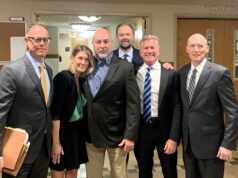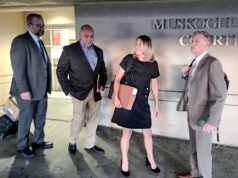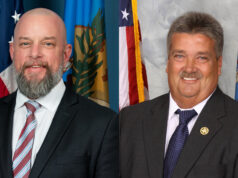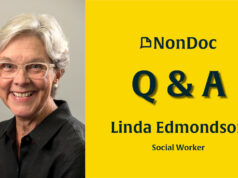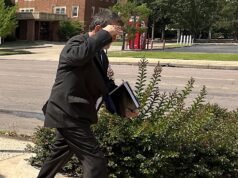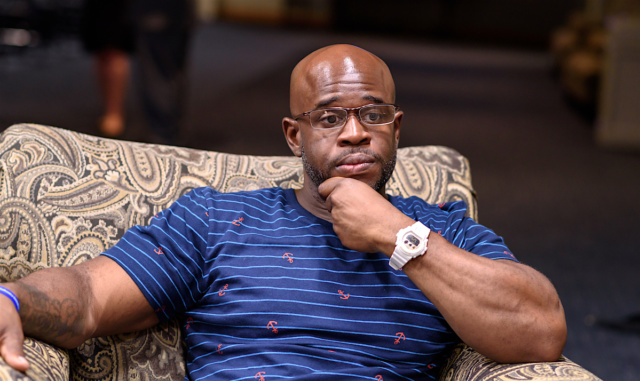

For most of us, an incredible number of life events took place between 1994 and 2016. Marriages, babies, vacations, job changes.
For De’Marchoe Carpenter and Malcolm Scott, those 22 years included days that mostly looked the same — exercising, watching TV, writing letters, praying — all while incarcerated for a crime neither man committed.
Carpenter and Scott have been back out in the free world since May 9, a date that will forever be etched in their minds. That was the day Tulsa County District Judge Sharon Holmes announced the two men — accused and convicted of killing 19-year-old single mom Karen Summers — were to be freed after 22 years in prison.
Carpenter and Scott told their stories at the Oklahoma City University School of Law on Thursday evening, relaying their emotions and memories to a room of law students and supporters of the Innocence Project, a national effort to exonerate wrongfully convicted prisoners.
Oklahoma chapter of the Innocence Project is embedded at OCU, and the group has celebrated the new freedom of Carpenter and Scott as a victory for justice but also the tip of the iceberg.
“I believed that the truth was coming out,” Carpenter said Thursday. “I was in [the] county [jail] working out because I knew I was going home.”
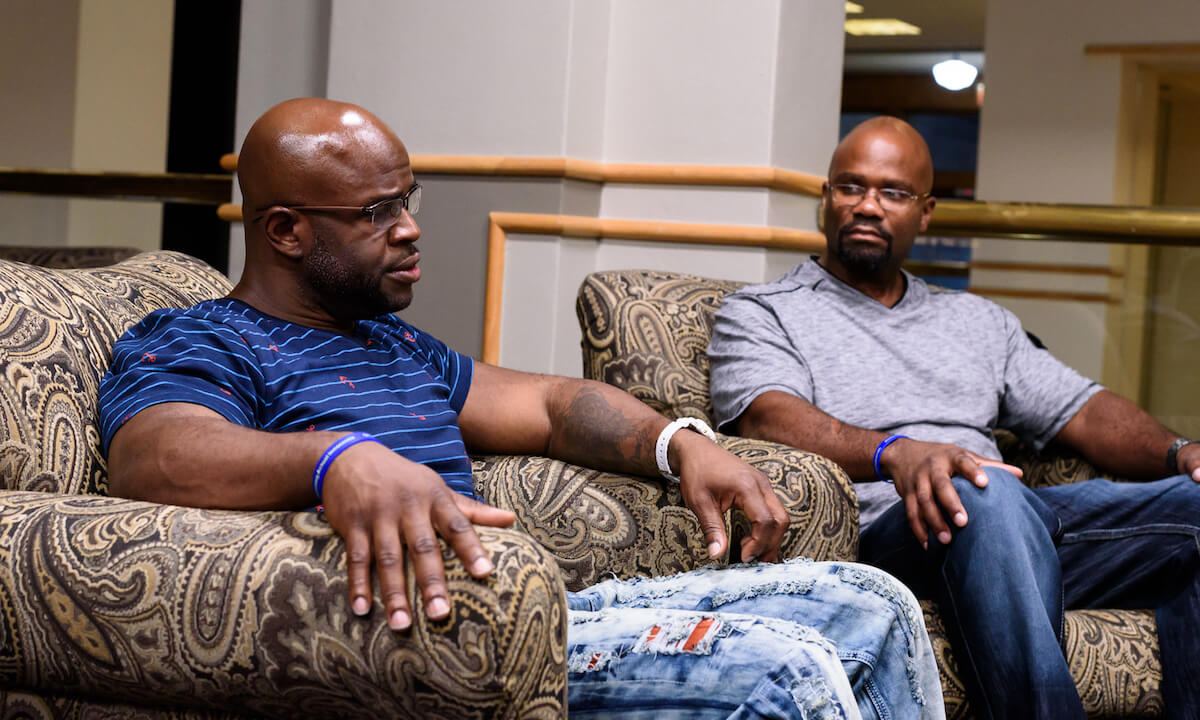
Going back to the day of the crime
Looking back, Sept. 10, 1994, started out much like any other day for Malcolm Scott. Having stayed the night at a friend’s apartment, Scott was thinking about the weekend and was hanging out with family when detectives showed up and changed the course of his life. Soon, he and Carpenter were overwhelmed and intimidated by the accusatory nature of the detectives.
When the day began, the two 17-year-old Tulsans had been unaware of Summers’ drive-by murder. When the day ended, however, they were the primary suspects for the crime. They were ultimately charged and arrested.
Scott and Carpenter were shocked and couldn’t understand why they had been locked up when both men had alibis and knew they hadn’t been at the scene of the crime.
“They had already made their minds up,” Scott says of the detectives in retrospect.
What Scott and Carpenter didn’t know when they were being questioned was that the man who would eventually confess to the crime had named them as the shooters. Michael Lee Wilson had been the triggerman in the gang-related drive-by shooting, an action that Carpenter said was in retaliation for Wilson being shot in the leg by a member of the Hoover Crips a few days prior.
Scott and Carpenter were also unaware that two witnesses at the party where the shooting took place had tabbed Scott and Carpenter as being in the maroon Ford Taurus. One of those witnesses was Kenneth Price, who was shot in the buttocks when he turned and ran from the direction of the car.
The car and the weapon were both found in Wilson’s possession but his relationship with the police — Carpenter said he was an informant — led to him striking a deal that focused the attention on Carpenter and Scott instead. Carpenter said he and Scott were not in the car that night, nor were they members of the gang. He said they only knew Wilson as just another guy from the same neighborhood.
The next several months were intense for the pair, who were facing a life sentence if convicted. A plea deal for eight years was even offered, but the young men believed so strongly in their innocence and their faith in the criminal-justice system that they put their fates in the hands of the jury.
“They didn’t have anything,” Scott said, referring to the actual lack of evidence tying either of the men to the crime. “Who takes that deal?”
“The deal is, we’re innocent,” Carpenter added, showing the passion of 22 frustrating years behind him.
The decision went against Carpenter and Scott, despite Wilson backing out of his deal with prosecutors. Price and Rashun Williams testified they had witnessed Scott and Carpenter in the car, and additional testimony about gang involvement may have helped sway the jury to return a guilty verdict.
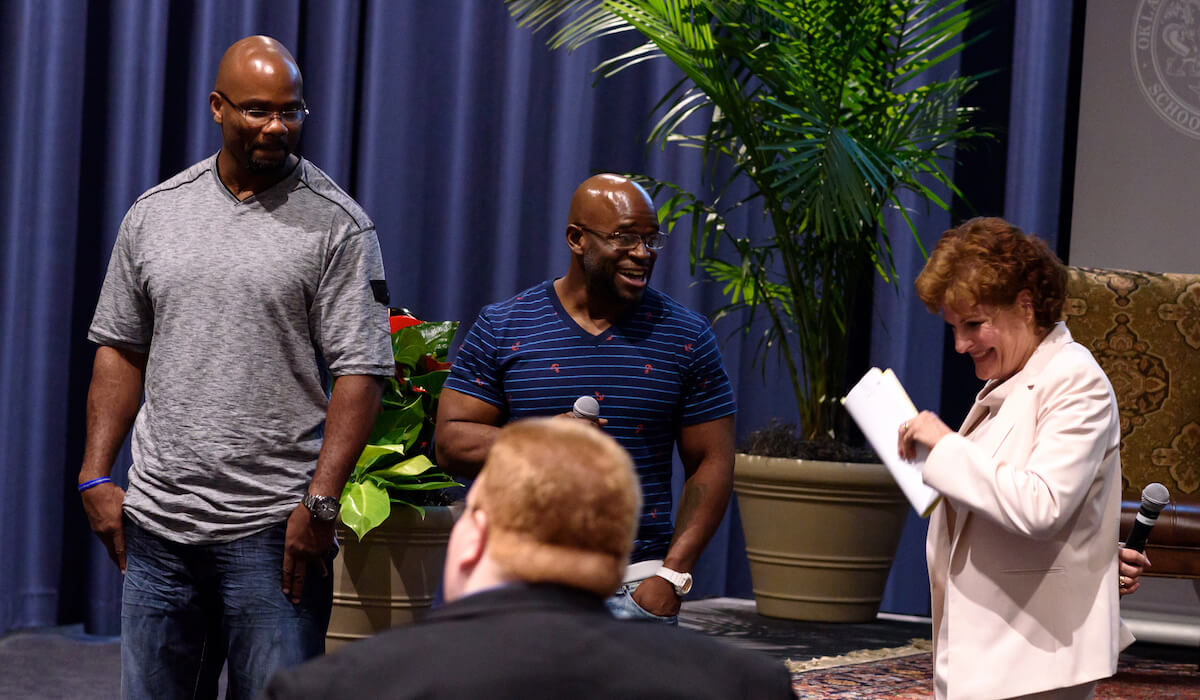
Twenty-two years behind bars: ‘How am I going to survive this?’
The next 22 years spent behind prison walls proved to be a real test for the Carpenter and Scott, who spent countless hours working on appeals and convincing family members and friends they weren’t guilty. Despite the years mounting up and the failed appeals continuing to grow, the two continued to maintain their innocence to anyone who would listen.
Thursday, Carpenter said his introduction to the maximum-security prison in McAlester was intimidating and something that stuck with him. He was transferred the day of a scheduled execution, and he remembers the guard at the top of the gate with a gun ready to be fired at anyone who attempted to make a wrong move.
“I’m scared to death,” Carpenter recalled. “How am I going to survive this?”
Survive he did. He reached out to politicians, attorneys, athletes and even talk show hosts. All to no avail. His parole was rejected twice in 2009 and 2012.
On the other side of the prison, Scott was independently proclaiming his innocence as well by writing letters. Sometimes they sent letters to the same people, despite neither man having an opportunity to talk about combining their efforts.
One of the men they both reached was attorney Eric Cullen, who began helping them in their appeals. Cullen even reached out to Wilson, who ultimately helped turn the tide in favor of Carpenter and Scott by admitting in a video-taped confession obtained by the Oklahoma Innocence Project that he had, in fact, been the triggerman. The confession occurred just prior to Wilson being executed for another crime he had committed months after the murder of Summers.
The two other witnesses, Price and Williams, also recanted their statements. Price said on the stand he was coerced into identifying Carpenter and Scott as the shooters, while Williams said in a signed affidavit prior to his death in 2013 that he didn’t actually see who pulled the trigger.
Innocence Project steps in
The Oklahoma Innocence Project took the case in 2014. As an extension of Oklahoma City University’s School of Law since 2011, its mission is “dedicated to identifying and remedying cases of wrongful convictions in Oklahoma.”
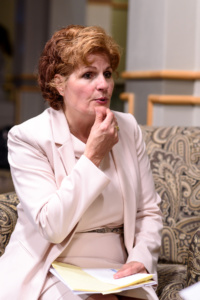
For Behenna, the outcome was one that she will always remember as a highlight of her career. Despite a professional résumé that includes a prosecutorial role in the Oklahoma City Bombing case among her two decades in the U.S. Attorney’s office, Behenna said the May 9 announcement remains a foremost achievement.
“It was something I will never forget,” Behenna said. “It was truly the pinnacle of my career.”
While the two men aren’t completely off the hook — the decision by Holmes was appealed by the state — they fully believe they will continue to be found innocent. If that happens, as they predict, they intend to seek $175,000 in compensation made available to victims of overturned convictions. Despite all of this, however, both men just want to move on and make the most of their lives that remain.
Scott and Carpenter’s successfully overturned convictions have opened the door for what Behenna and the Oklahoma Innocence Project hope are more releases. Behenna said her staff is working to appeal the conviction of a man named Willard O’Neal, and they have a hearing set for later this year.
A new life
Carpenter and Scott are now working to begin the lives they never had a chance to live.
Carpenter married his childhood sweetheart, Brandy Guest, less than two weeks after his release from prison. He is now working at a heat-and-air job while taking forklift classes as part of a program sponsored by Operation Hope. He also wants to find a publisher for the book he has written called Buried Alive about his time in prison. He hopes to release it next year.
As for Scott, he also came home to someone. Kimmie Miller welcomed him with open arms. Scott works a job at Whitlock Packaging while taking classes at Connors State College in Muskogee. He hopes to become a physical trainer.
Understandably, Scott said his biggest adjustment has been learning how to use a computer.
“That has really been a process for me,” Scott said, half-joking about the learning curve. “Sometimes I feel like a caveman.”
For more information, visit okinnocence.com.









